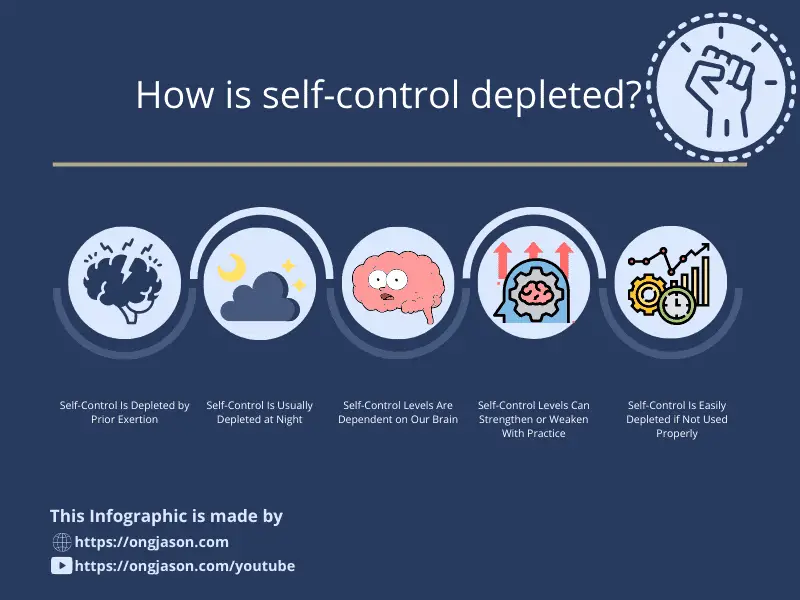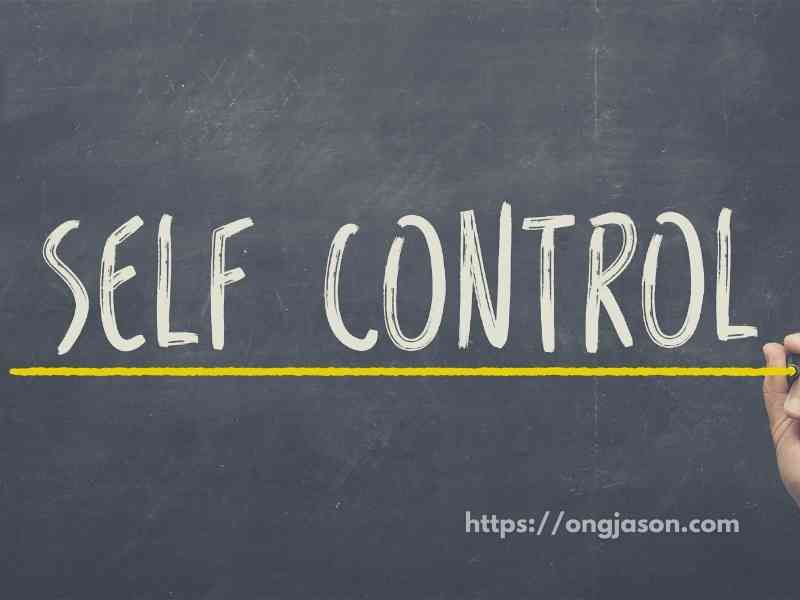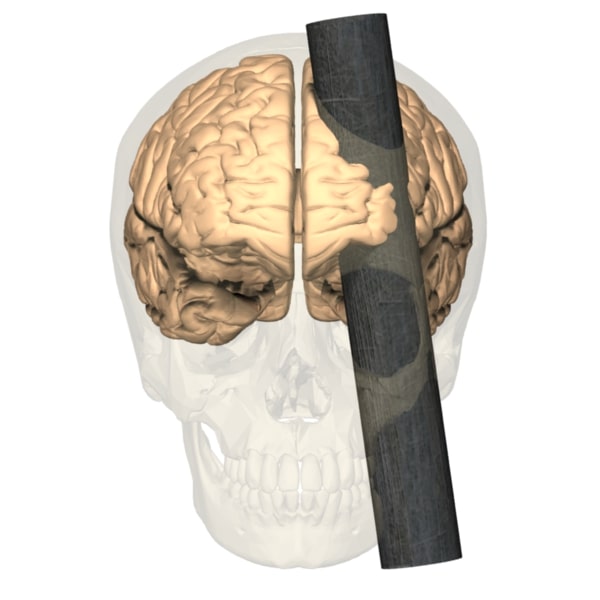How is self-control depleted | Are You Getting the Most Out of It?
Self-control is our ability to prevent or negate ourselves from doing our impulses. In simpler terms, we use self-control to do the things that are good for us and not do things that are bad for us. However, when we examine self-control in a deeper sense, we can actually feel that it gets depleted. What I mean by this is that there are instances where we feel that our self-control is depleted.
The main point of how self-control is depleted is that it is like a muscle. Much like using a muscle depletes its energy, so thus self-control. The most common reason why self-control is depleted is by just using it incorrectly. This happens when our environment is not in line with good habits.
In this article, we are going to discuss more on this topic. I have 5 ways how we lose self-control. We are going to know the reason this happens and simple things to do to prevent this from happening.

Self-Control Is Depleted by Prior Exertion
We lose self-control by prior exertion. What this means is that using our self-control means we are losing or depleting it. When we exert effort in preventing our impulses, we lose our self-control depending on how tempting the tasks are.
Much like muscle, when we use self-control, it just gets weaker.
This is much like using our muscle that gets tired and weaker the more reps we do. That’s the same for self-control. We get weak because our self-control usually gets weaker the more we use it throughout the day.
This is known as Ego Depletion.
We lose self-control just by using it every day. Self-control is basically our energy to prevent the things that are bad for us, such as temptations and impulses.
That is why we can notice that it is harder to force ourselves into working when we are tired. This is simply because our energy level for self-control is also down when we’re tired.
We can particularly see ego depletion in action in the famous chocolate and radish experiment.
The Chocolate and Radish is an experiment made by a psychologist named Dr. Roy Baumeister from Princeton University. Basically, it is an experiment done in order to prove that willpower or self-control is something that can be depleted.
I am going to explain the experiment so that you can get what I mean.
Basically, the experiment made their subject solve multiple puzzles with the promise of giving chocolates at the end of the experiment. Solving a puzzle is quite hard and uses too much willpower or self-control.
Furthermore, they use the smell of chocolate as a means of temptation while the subjects are solving puzzles.
After the puzzle, one group was given their chocolate, and they were more willing to solve another puzzle after. For the ones that were given radish and not chocolate, most got mad and didn’t want to do the experiment anymore.
This just showed that the ones given with radish were annoyed because they were tempted a lot and they didn’t want to use their self-control again for another puzzle.
That’s why some lose their cool upon a bad day. Or why we are prone to our impulses when we’re tired.
This is basically because our self-control is limited, and it gets smaller the more we use it.

Self-Control Is Usually Depleted at Night
One reason why self-control is being depleted is that you’ve basically used all your energy levels the whole day. This is because our self-control is a finite resource. This means that it just gets depleted when we use it. At night, we have less self-control because we already use it to get by the day.
This concept revolves again around self-control being depleted by using it.
Most of us use our self-control throughout the day. Because of that, we usually have low energy levels or low self-control at night,
That is also one of the reasons why mornings are the perfect time to do the things we must do, such as working for our goals or imposing good habits.
In fact, it is also what I use. I usually find that working right after waking up is perfect if I want to get my productivity to the next level.
It is relatively easier to force myself into working right after waking up than working at night.
Most of us want to relax or watch TV at night, including me. We just have less self-control at night because we use it to get through the day.
Getting low self-control at night is normal, with the only exception of some night owls, just because they usually like sleeping during the day and have high energy levels at night.
That’s why, if you want to work on your goals and you want an easy way to force yourself into doing things, then I recommend you to do it right after waking up. Just try it, and you’ll be surprised at how much easier it is to force yourself into working right after waking up.
Recommended Read: If you want to know more about goal setting and how many goals are good if you’re looking for results, I recommend this article. This would make you more efficient in reaching your goals. Here is the link: How many goals should you have at a time?

Self-Control Levels Are Dependent on Our Brain
The level of self-control of an individual is directly tied to their brain. The reason for this is that self-control is usually from the prefrontal cortex of our brain. This basically means that the larger or bigger the prefrontal cortex is, the more self-control an individual has.
Our self-control is from the prefrontal cortex. The prefrontal cortex is the one responsible for our logical reasoning and intelligence.
That’s why self-control is usually linked to logical reasoning. The reason being we use our logical thinking in beating our impulses or temptations.
That’s why, when we are talking about self-control, we can actually see how strong our self-control is just by looking at our prefrontal cortex.
That means that your brain size or strength is related to your self-control. The stronger your prefrontal cortex, the higher your self-control level you have.
But that doesn’t mean that the size of your prefrontal cortex can’t be changed. In fact, neurogenesis or the increase in brain size or number of brain cells is now widely accepted in science.
That means, we can have a stronger prefrontal cortex and stronger self-control or willpower.
With stronger self-control, its depletion would be less likely.
Actually, I’ve discussed this in great detail in my other article which linked self-control to intelligence. If you’re interested in learning more about this Is self-control a sign of intelligence?. Furthermore, I gave a few tips on how to increase your self-control in that article.
But what example can I give on the relationship between our prefrontal cortex and self-control?
The perfect example is an accident of a foreman named Phineas Gage. He actually got into an accident from his construction work, and a crowbar hit his skull. Unfortunately, it not just hit his head, but it broke his prefrontal cortex.

As you can see in the picture, the crowbar destroyed his prefrontal cortex.
He miraculously survived the incident but what happened to him became strange.
His colleagues always tell that Gage is “not being Gage anymore.” The reason being he just doesn’t have self-control anymore, that he is always acting according to what he feels like doing.
Before the incident, he is described as someone with intense willpower. However, that became a total opposite when his prefrontal cortex was destroyed by the accident.
That’s why experts have found that the prefrontal cortex is responsible for our self-control. The good news is that we can strengthen it, as discussed in the next section.
Self-Control Levels Can Strengthen or Weaken With Practice
Self-control levels can be strengthened or weakened. Much like a muscle that can get stronger or weaker if we use or don’t use it, this is the same for our self-control. Therefore, we must practice self-control for it to be stronger.
Now that we’ve linked self-control to our brain, and I also explained the concept of neurogenesis, we can now tell there are ways to strengthen our self-control.
I made a video discussing the book the willpower instinct, in which the book gave numerous insights on how you can increase your willpower or self-control.
If you are interested, here is a video of me summarizing the book.
But here is the concept.
The more you practice willpower, the stronger it gets. If you stopped using your willpower, it would weaken as time went by.
Just try increasing or training your logical reasoning skills, then you will see that your self-control will increase along with it.
These practices include:
- Doing some puzzles
- Brain exercises
- Having few temptations on purpose
- Fighting your urges
There are more things you can do to increase your self-control level. Again, I recommend you read the book or watch the video.
Self-Control Is Easily Depleted if Not Used Properly
Self-control is quickly depleted if you don’t know how to use it properly. This is because willpower or our self-control is limited, so we must use it efficiently. By not efficiently using our self-control, we aren’t being productive enough with our limited energy.
Since we already know that self-control is like a muscle that gets tired, one way to increase it is by strengthening your logical reasoning and intelligence.
Another way that is much more instant is by efficiently using your willpower.
This is like saving gas because you’re driving your car without pressing the gas pedal too much.
The reason for this is that there are just times that we are using our self-control on things that we shouldn’t be using it for if we want to be efficient.
Remember that we are talking about saving our self-control so we can use it on something more important.
For example, if you want to eat healthily, make sure that your dinner table has fruits instead of junk foods. If you want to jog in the morning, make sure that everything is ready the night before.
If you want to cut your social media time, install an app or website blocker. If you’re going to sleep earlier, then do not use your phone in bed.
These things might seem hard to do, but if your environment promotes good habits, you wouldn’t need to use most of your willpower in these activities.
That means you can use your willpower for other important things because it won’t be depleted.
That way, you can prevent your willpower from going down fast throughout your day.

“Only the things I love.“
ongjason.com is reader-supported. When you buy through links on the site, I earn an affiliate commission.
If you’re following me, you’ll know that I believe it is essential to have some tools, whether it’s for personal development or lifestyle in general.
So, here are the things I love.
YouTube
If you want to learn things for free, I recommend watching my YouTube Channel. Click the Button Below to go straight into my Channel. 🙂
Okay, let me first explain my Channel.
I believe that I really can’t explain everything too well on my blog. That’s why I created a YouTube Channel so I can easily explain a lot of things. Plus, I believe that Video Sharing is the future.
Recommended Books
The next thing is books. Books are, for me, one of the cheapest ways to get invaluable information. We can learn personal development, finance, career, relationships, and many more from books.
Here, I will be listing my favorite books in different categories.
- For Beginners – 7 Habits of Highly Effective People by Stephen Covey – Personal development has a lot of concepts and ideas to learn. Thus it can be really hard for beginners to know where to start. Thus, I recommend this book since all the basic concepts of personal development are here(except finance, check what I recommended for that)
- Productivity – The One Thing by Gary Keller – This book teaches us the power of focusing on one thing which is the ultimate source of productivity. The concepts taught are what I am using to constantly publish YouTube videos while maintaining this website.
- Busy? – Make Time by Jack Knapp – This book teaches us how to make time for the things we love. The concept is really simple but I think that makes it a book worth reading.
- Health – Lifespan by Dr.Sinclair – This Book teaches about the latest scientific research on lifespan. In his book, he has shared numerous things he is doing to slow down his aging process. This can be as easy as eating less which he recommends.
- Finance – The Richest Man in Babylon by George Clason – Perhaps one of the first books I’ve read about Finance, this book for me is the best if we are talking about learning basic finance such as basic saving and investing. The concepts are very simple but effective.
Audiobooks
Take this advice as a grain of salt.
I don’t recommend buying Audiobooks one by one. I mean, audiobooks can be quickly finished by listening while working out or doing some mindless tasks.
So here is to save you some money. Just go for a monthly subscription to Audible. I believe that you will save a lot of money with that plus, they usually give freebies to anyone starting.
My Audiobook Recommendation will always be the same as my book recommendations, but I personally like The 5 Second Rule by Mel Robbins. I like how she is so casual while reading her book.

![How to Categorize your Goals [10 Categories w/ Examples]](https://ongjason.com/wp-content/uploads/2021/07/Goals-768x576.jpg)




